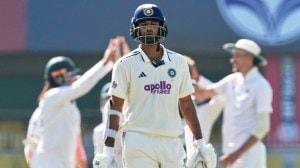SC stops TN shutdown by DMK: bandhs are illegal
Sethusamudram Karunanidhi declines comment on court order, decides he will fast today.

Slamming the very concept of a bandh and the perceived defiance of law, the Supreme Court today stopped the DMK-sponsored Tamil Nadu bandh called tomorrow to demand early completion of the Sethusamudram shipping canal project.
Holding a rare sitting on a Sunday, the bench of Acting Chief Justice B N Aggrawal and P P Naolekar ordered that the DMK and its allies shall not go ahead with the bandh either on October 1 or any other date, as the bandh per se was illegal and unconstitutional in view of the court’s earlier ruling on the validity of bandhs.
Stung by the court order, Tamil Nadu Chief Minister M Karunanidhi changed plans and decided that he and his alliance leaders would fast tomorrow in support of their demand. Declining to comment on the order, Karunanidhi told reporters “the hunger strike is for removal of Nandis (obstacles)” for speedy implementation of the project. Instead of the bandh, we will be observing a fast, he said.
The Supreme Court passed the direction on an “urgent application” filed by the opposition AIADMK along with its special leave petition seeking an injunction against the bandh. The three-hour argument that preceded the direction saw the bench making some scathing and stinging remarks against the very concept of a bandh.
“That’s the problem in this country. We have to deal everything with an iron hand in this country. Otherwise things will not work. Every organ, let it be the legislature, executive or judiciary has to deal with an iron hand,” the bench said.
Recalling that in 1998 the Supreme Court had clearly upheld the ruling of a full bench of the Kerala High Court which had said that calling or enforcing a bandh was illegal and unconstitutional, the bench regretted that orders of the courts were being violated.
“We have come to this stage in the country that everything has to be monitored, hammered or directed by courts. Even orders of the Supreme Court are not observed, what to talk of the High Courts. Ninety-nine per cent of the High Court orders are not complied,” the bench said.
The bench rejected arguments of senior counsel Altaf Ahmed and A K Ganguly appearing for Tamil Nadu and the DMK that the October 1 protest programme was not a bandh call but a “hartal”.
“If it is a bandh, then it is a breakdown of the Constitutional machinery.Your own resolution says that the programme on October 1 is intended to ensure complete cessation of all activities, then how can you say it is not a bandh?,” the bench asked the Tamil Nadu counsel.
The bench brushed aside the claims of the state and the DMK that what was essentially intended was a public meeting.
“Where is the public meeting? You show us. Your resolution say it is cessation of all activities and work. You want to show your popularity. Why do you want to close all educational institutions and commercial activities? Where will you then find people for your meetings?” the bench said.
“Your protest is against whom? The project, Central government or against this court?” the bench asked to which the counsel claimed that the protest was for seeking early implementation of the project.
The apex court also rejected the arguments of the state that the Madras High Court had permitted the protest programme by ensuring that there was on hindrances to the normal public life.
The bench said it was mainly concerned with the issue of deciding whether a bandh call can be given by any individual or organisation, after the concept of bandh had been declared illegal and unconstitutional by the apex court.
According to the bench, a bandh call essentially paralysed public life and was violative of the Fundamental Rights guaranteed under Article 19 (Freedom of Speech) and Article 21 (Right To Liberty) of the Constitution.



- 01
- 02
- 03
- 04
- 05




























